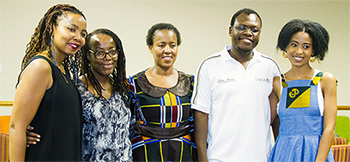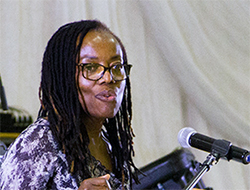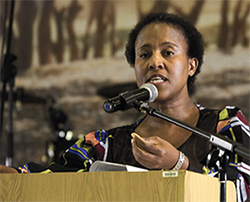News & Events
African women activism is alive and kicking!

Prof Pumla Gqola (Wits), Tsitsi Dangarembga (Zimbabwean author & filmmaker), Dr Edith Phaswana (TMALI), Prof Vusi Gumede (TMALI) & Simamkele Dlakavu (Wits)
Well-known Zimbabwean author of Nervous conditions and director / filmmaker of Everyone’s child, the playwright, poet and activist, Tsitsi Dangarembga, believes that African women activism is alive and kicking! "Through promoting the social, economic, cultural, and political achievements of women, activism is achieved."
She was addressing the International Women’s Day celebration on 10 March 2017 at Ormonde, Johannesburg, hosted by Unisa and the Thabo Mbeki Foundation. Women are celebrated globally on 8 March, a day that marks their social, economic, cultural and political achievements.
Dangarembga argued that women need to engage with ongoing vigour and action towards the cause, which is what will distinguish woman activism from feminism. "Activism has to be taken out of theory and be put into practice. There’s so much theory written about the concept but it is hardly practised. If we are to be true activists we have to get out of our comfort zones."
Activism is beneficial to society

Tsitsi Dangarembga, Zimbabwean author and filmmaker
She further said that activism is carried out for the betterment of society, which is opposed to feminism. "To successfully change the world we need to move from the capitalist ideology of the individualist as it dictates that women should not do anything about other women's suffering."
"And we can," urged Dangarembga, as she believes that the movement cannot afford to leave people out. "We have to be equally concerned with how activism is beneficial to society."
She believes that African women activism needs a paradigm shift as women have to be equally concerned about "how we act with one another as women and how African women identify with each other".
Dangarembga said that dominant ideologies divide African women into different groups. "We now have ideologies on sexual preference, religion and class that separate us. As African woman activists we have to be intimately involved with these ideologies in order to fully engage and interrogate them."
"As activists," she said, when concluding her address, "we need to step forward in the public space, with vigour and engage in powerful discussions and not shy away from confrontations. Men will have to step back and cheer us up as they cannot be women activists."
Women should never stop fighting for each other
Both women and men came together during this celebration to highlight women’s successes and their achievements as African women. The theme of women activism tied in with the day’s call to action for the acceleration of gender parity by focusing on the advancement of black feminism.
In her opening address, Dr Edith Phaswana, senior lecturer at Unisa’s Thabo Mbeki African Leadership Institute, pointed out that the struggle women face today for equality is nothing new and has been observed since the 1900s. "However," she said, "today’s women are at an advantage as they can help each other deal with the struggle. Even though there have been great improvements witnessed especially in the latter years, women should never stop fighting for each other."
After the address, Pumla Gqola, Associate Professor in the Department of African Literature and student leader ,Simamkele Dlakuvu, both from the University of the Witwatersrand, joined Dangarembga to discuss issues and answer thought-provoking questions arising from the panel discussions.
Is feminism divisive, unAfrican and anti-black?

Dr Edith Phaswana (TMALI)
The 2017 International Women’s Day celebration called for the interrogation of the different narratives and thoughts about black feminism. The question raised in the 2017 concept note developed for the celebration was "Is feminism divisive, unAfrican and anti-black?" The celebration was also seeking to debunk the myth associated with feminism which has been blamed for a myriad of social ills witnessed within the continent.
Some stated that feminism has been blamed for the destruction of black family structures, while others blamed colonialism for diminishing the black race and for the emergence of sexism, misogyny, patriarchy, classism and homophobia. It was against this background that the celebration sought the answer to the questions:
- Is feminism / black feminism a divisive tool used by white supremacists?
- Why are feminists feared within the black struggle against white supremacy, and what can we learn from this?
- What role should feminists play within the black radical movements?
- What forms of resistance should they consider?
- How should black feminists maintain a balance, if any, in their fight against multiple oppressions without compromising the struggle against white supremacy which continues to be an integral part of the post-apartheid state?
* By Itumeleng Mpete
Publish date: 2017-03-31 00:00:00.0
